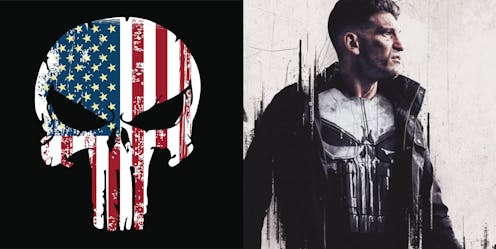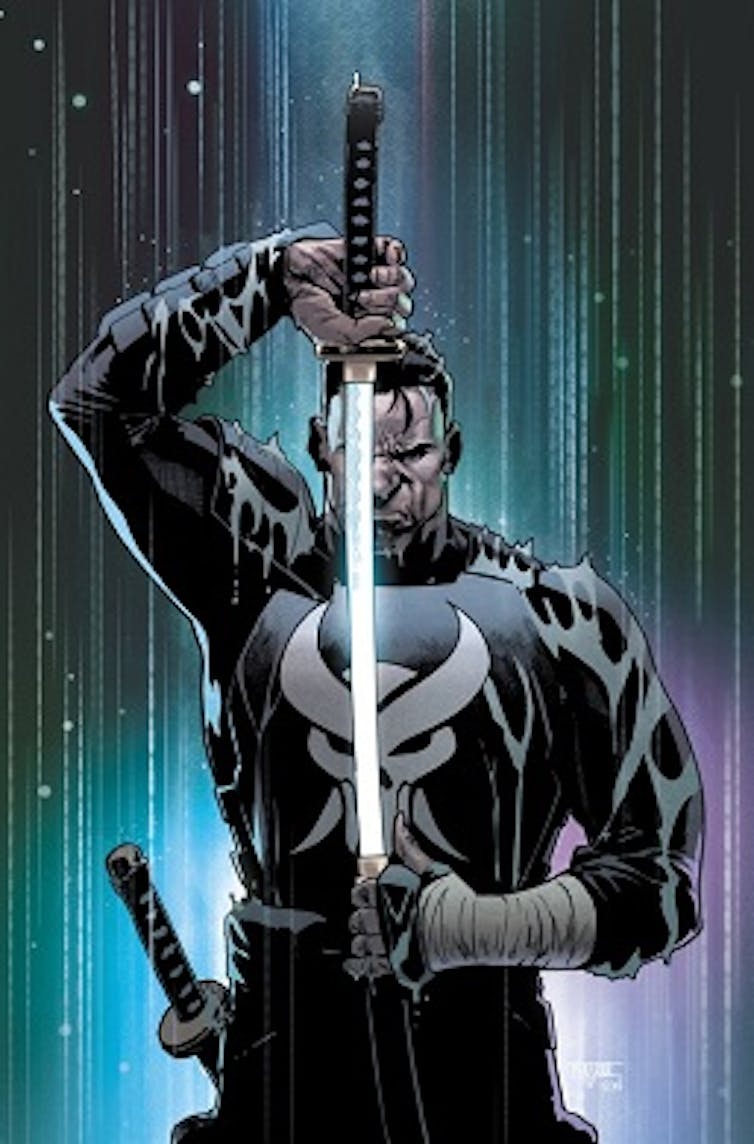
In Travis Linnemann’s book The Horror Of Police, he quotes David Grossman, founder of the “bulletproof warrior” seminar series, notorious for teaching police that killing is “just not that big of a deal.”
At the end of a long day, Grossman says, police should “look out on your city and let your cape blow in the wind”.
This suggests police should see themselves as superheroes. In reality, they seem drawn to one superhero in particular: the classic Marvel comics character, the Punisher.“
He doesn’t wear a cape, admittedly. He’s more famous for the stylised skull logo plastered across his chest.

Brutal and abusive
It’s a skull that a group of rogue officers in Milwaukee wore while on patrol in 2011. They were characterised as "brutal and abusive” by a police academy supervisor. In 2017, the logo was added to police cruisers in Lexington, Kentucky – morphed together with a Blue Lives Matter flag – and only removed after public outcry.
A Chicago officer wore a Punisher skull in 2019 while pointing his weapon at teenagers, and police wearing the same skull were spotted at the crackdowns after George Floyd’s death in 2020.
Before you think this is limited to America, the skull has appeared on an Australian police car, too.
Why do so many police love the Punisher?
What makes the Punisher so appealing to these police? Created by writer Gerry Conway and artists John Romita Sr. and Ross Andru, the Punisher first appeared in Amazing Spider-Man #129 in 1974. He was the gun-toting, ex-soldier Frank Castle, determined to wipe out crime with deadly force after his family were murdered in front of him.
While initially an antagonist, it wasn’t long before he graduated to anti-hero. By 1986 he starred in his own Marvel miniseries, by the late ‘80s he was popular enough to have multiple ongoing comic books at once.
This included ten issues of The Punisher Armory, one of the strangest series Marvel has ever published: just page after page of flat, technical drawings of weapons. As Professor of Political Science Kent Worcester wrote in Law Text Review:
It is difficult to think of another comic book figure, in any universe, that could inspire such a relentless, militaristic, and fetishistic series.
A Marvel editor, Stephen Wacker, once noted the Punisher had killed around 48,502 people since his first appearance. Compare that to Batman, who refuses to kill – much to the annoyance of some fans. According to critic Glen Weldon, this is more than a moral decision. It’s also a “deliberate storytelling choice: it would be easy to mow down a roomful of bad guys with an uzi”.
Why would the police choose the Punisher skull instead of Batman’s logo? The police chief in Lexington, Kentucky, defended its use on their police cars by saying that the skull “represents that we will take any means necessary to keep our community safe.”
The adoption of the skull is a sign some police no longer want to be police – they want to be vigilantes, capable of using “any means necessary”. After all, as Worcester states, “the legal system is little more than an inconvenience” to the Punisher.
The vigilante impulse
After American citizen Kyle Rittenhouse was found not guilty of murder, after killing two men and seriously injure a third with a gun during a Black Lives Matter protest, a New York Times opinion piece described the vigilante impulse as a “central feature of the American experience”. The police are far from immune.
Gerry Conway, the Punisher’s co-creator, is appalled by law enforcement adopting the logo. He said on Twitter:
Any ‘cop’ who wears a Punisher logo in his official capacity is identifying law enforcement with an outlaw. These ‘cops’ are a disgrace to serious police officers everywhere. They show an imbecilic level of irresponsibility and should be fired immediately.
Many called on Marvel to make a statement about the skull’s unofficial use after the George Floyd crackdown. A spokesperson said they were “taking seriously” any unlicensed usage, but otherwise referred to a general message shared by Marvel:
We stand against racism. We stand for inclusion. We stand with our fellow Black employees, storytellers, creators and the entire Black community. We must unite and speak out.
They also pointed to a specific issue of The Punisher from the year before. In The Punisher #13 (2019), Frank Castle tears up a skull decal on a police car, explaining that if the police want a role model, they should look to Captain America instead.
This set a precedent: it is the character who would apparently be speaking for the company.
Professor of Film and Cultural Studies Will Brooker writes that origin stories are those that “bury the old, battered, weaker self and give the character a new life as someone braver and bolder”. But the origin for the Punisher’s crusade – watching his family die – had already been complicated by other Marvel stories.
A recent Punisher series suggests it wasn’t his family’s deaths that created the Punisher. It shows teenage Frank as a pathetic loser in grimy flashbacks, sulking in a Captain America mask. Instead of allowing him to become “braver and bolder”, we see Frank was always prone to fits of extreme violence.
In this version, the Punisher didn’t begin as a “bulletproof warrior”. He was a disturbed child – more Dexter Morgan than Dirty Harry.
Skulls for justice
A few years ago, Punisher creator Gerry Conway launched an initiative called Skulls For Justice. It asked artists to create new versions of the Punisher skull by combining it with the imagery of Black Lives Matter. Conway explains:
For too long, symbols associated with a character I co-created have been co-opted by forces of oppression and to intimidate Black Americans. This character and symbol was never intended as a symbol of oppression. This is a symbol of a systematic failure of equal justice. It’s time to claim this symbol for the cause of equal justice and Black Lives Matter.

These skulls were not approved by Marvel. However, in the latest Punisher series, Marvel has also changed the iconic logo on Frank’s chest. Almost as if they know the old skull is too toxic to be redeemed, and – at least for now – they’re abandoning it to the vigilante police who’ve embraced it.
Martyn Pedler does not work for, consult, own shares in or receive funding from any company or organisation that would benefit from this article, and has disclosed no relevant affiliations beyond their academic appointment.
This article was originally published on The Conversation. Read the original article.






